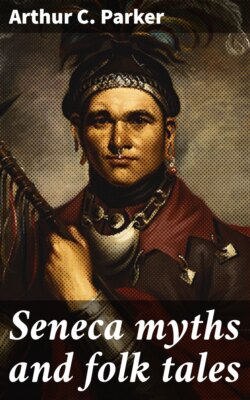Читать книгу Seneca myths and folk tales - Arthur C. Parker - Страница 29
На сайте Литреса книга снята с продажи.
3. THE DEATH PANTHER.[12]
ОглавлениеTable of Contents
Now the old folk say this is true.
Two boys were fast friends and always were seen together. Their favorite sport was to play in the waters of a deep lake that washed the feet of a tall white-headed mountain that lay a distance from the village.
One day as they splashed in the water, swimming, diving, and sporting as boys do, one suggested that they both dive at the same instant and see which could remain below the surface the longer. This suggestion was at once acted upon and each time they dove they remained below a greater time.
In the course of the game one of the boys, Oohoosha, by name, discovered a flat projecting rock to which he could cling. As he lay holding fast to the rock after a dive he saw a hazy indistinct object approaching him and when it neared him he saw that it was a tall warrior whose smooth glistening body was the color of the sky or the color of clear water when the clouds pass over.
“Come with me,” said the man, in a friendly manner and although he had never heard this language before, Oohoosha strangely understood it now. So, marveling, he followed.
The dark green water began to clear and in the distance, he thought he saw a number of boys playing ball. The guide led Oohoosha into a large moss-covered council hall where a stout preacher, with a yellow and pink face, swaying body and large round eyes was declaiming to the people.
“God created all good things and made men as well as fish!” he shouted, as the bubbles floated up from his mouth. “The earth people are his children as well as we, so why should not we who know and foreknow many things, notify them that trouble is coming and warn them to avoid it?”
“I will go,” said the boy’s friend, as he pulled his cap. “It is my office.”
The preacher rolled his eyes and looked at the speaker, with a shudder and then called out, “Gaă‘sioñdie´t’hă’ has promised to go. May he succeed!”
The preacher sat down and the dances began, and long and solemnly the people danced. After these ceremonies the boy’s friend told him that he must go up to the earth-world and warn men of disaster. He took him to his lodge and bade him care for it during his absence. He was to have free access to everything save the back room of the lodge which he must shun. With a few general instructions he departed, leaving Oohoosha to care for his interests.
For four moons the boy kept watch, over the lodge and dwelt there but no one came near him, and when at last the friend returned Oohoosha asked how he had fared.
“Ah!” sighed the man, “do not ask me. You must not stay here longer, for in my madness you may see me as I am. I am the messenger of death. He is Sondowekowa, I am Gahachendietoh. I am in disguise but should you see me you would soon die, so depart and preach what I whisper that henceforth mankind may profit.”
With trembling limbs and blanched face the boy listened to the whispered words of his friend and when he had learned all, he shot upward to the surface of the lake. Striking out he swam to the shore and searching beneath a rock shelter he found his clothing as fresh as when he had doffed them. Dressing, he set out to find his comrade. He came to the village but found on its site only charred and blackened frames. A deep-trodden trail bordered with the bones of dogs and fragments of kettles led away to the west, and following it Oohoosha saw a new village, but only a few houses were there. The people who moved like ghosts silently about were gaunt and scarred.
Suddenly a lodge door opened and out rushed his old comrade, who seeing Oohoosha, drew back with a cry of fear and surprise; but Oohosha calling, he came forward timidly and took his hand. Looking at him doubtfully he spoke.
“Oh, Oohoosha!” he cried. “How came you back from death! I thought you drowned four moons ago when we dived in the lake.”
“While I clung to a rock,” answered Oohoosha, “a man came to me and said ‘follow!’ I did not drown but lived this while in the underwater world. Now, tell me, why is the village so altered and why do the people stalk silently about, with dull eyes?”
“Ah me!” said the comrade. “A devastating war has been waged and we are reduced in number; a terrible famine has swept away the game and crops; a pestilence carried away all but a handful of our people, then to add to our trouble a marauding band came and burned our village while we slept.”
“And did no warning sign appear?” asked Oohoosha.
“Yes, but we knew it not as such until it was long too late and then we noticed a blue panther floating high in the trees. He had no visible face but from his tail shot flames of fire.”[13]
“That creature,” exclaimed Oohoosha, “is the herald of disaster. His name is Gaă‘sioñdie´t’hă’ and when he is seen all men must burn tobacco. Tobacco incense is the sign that disaster is not wanted and when he has breathed it he will go away satisfied with the offering and turn aside the impending evil. But come, I must call a council and tell the people.”
